Supporting Women Entrepreneurs in Kenya: Tech, Mentoring & Advocacy
We're working with Smart Regional Consultants to deliver entrepreneurship skills training and mentoring to women across Kenya.

Our CEO Helen McEachern spoke with Catherine Gitonga, CEO at Smart Regional Consultants (SRC), with whom we’re partnering to deliver our services to women entrepreneurs in Kenya thanks to support from DHL Express. Together they discuss the landscape for women-owned enterprises in Kenya, and how we’ll collaborate to meet the challenges they face.
Helen: Well, as you know, Catherine, we have been working in Kenya for a few years now. Back at the start of 2020 we had just started the process of conducting research and finding a partner to launch our HerVenture app that May, and then COVID-19 happened, so the timing was really quite challenging.
People were really lacking opportunities to build skills in entrepreneurship during such a devastating time. Our app became a sort of lifeline and women who used told us it really was transformative because it gave them the information they needed to move online so their business could keep going. It was really incredible.
You’re a woman entrepreneur yourself of course. It would be great to hear from you a little bit about why you started Smart Regional Consultants, as you’ve just joined us as a partner!
Woman-led services to support entrepreneurship
Together with SRC and DHL Express, we're supporting women in Kenya with training and mentoring:
-
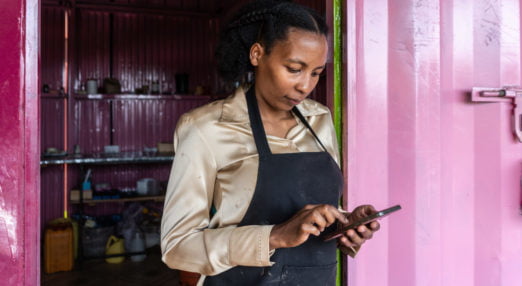
HerVenture in Kenya
Our free business skills app HerVenture has supported over 19,000 women entrepreneurs in Kenya to grow their businesses.
Read more
-
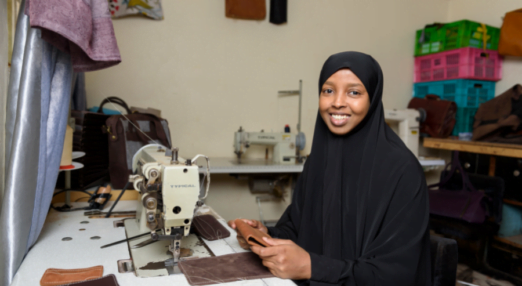
Road to Growth in Kenya
Our seven-week intensive Road to Growth programme has run in Kenya since Autumn 2021 with the support of our partners.
Read more
-
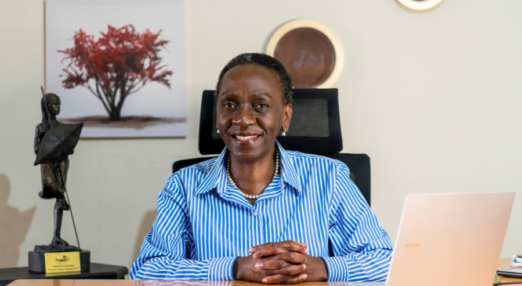
Road to Leadership in Kenya
Our Road to Leadership training supports women entrepreneurs in Kenya to thrive as leaders.
Read more
Entrepreneurship opens doors
Catherine: I grew up watching my mother both working in employment and running a side hustle, which is a thing in Kenya and probably common in the UK too – most people have a full time job and a side hustle. Her side hustles were running a small restaurant and a farm and it was mandatory that we had to work there as kids. So I got the entrepreneurship bug early enough!
I was employed in the consulting industry, working in financial literacy for youth and women, but I plucked up the courage to leave and start a company. It was challenging because I didn’t have my name known in the entrepreneurship sector, so it took a while to catch up, but I did. I first started a different company in financial literacy for youth, but then started SRC which provides entrepreneurship training for youth and women who have an idea, start-up or growth stage business. So from the very beginning, from watching another woman run enterprises, I felt able to start an enterprise in a very positive way.
Helen: When you started the business, were you thinking that you wanted to enable other people to be entrepreneurs or was it more about your own financial independence?
Catherine: It was a bit of both. Running an enterprise, you have the space to scale and make as much income as you can, whereas in employment there’s a limitation in terms of the ceiling of your salary.
When I was young, financial literacy was a challenge – I did struggle. But then, when I started working in that space, I realised that the availability of knowledge for young people on investing was limited. The general message is that you need to be wealthy and have assets like land, however saving and investing in money markets is something that is accessible for young people who don’t have access to a lot of income. That’s the angle I flew with. We simulated this stock market software and used it to teach young people how to invest in money markets. From there it grew, I got into networks, and I was able to partner with stock exchanges in Kenya, Uganda and Tanzania, which was successful for about 10 years.
Financial institutions need to create lending products that meet women’s specific needs and contexts so that they can access finance.
In the middle of that I started SRC. It grew from the ground up and eventually got into strategic partnerships with programmes funded by USAID, GIZ and other large organisations, and now here we are with Cherie Blair Foundation for Women. I’m always looking for new partners to deepen our entrepreneurship support. Now, we’re located in Nairobi and in five counties in Northern Kenya. It’s been an interesting journey and I love every step of it.
Contextualisation is key
Helen: There’s a lot of synchronicity between our organisations. We work entirely with local partners rather than setting up offices in other countries. While we know about women’s entrepreneurship and the kind of skills and support that women need from a big picture perspective, we don’t know the context in Kenya, for example, and indeed in different parts of Kenya. You and our other local partners are the experts whom we need to adapt and contextualise our services.
Catherine: I’d like to commend that you work with local partners. From interacting with your programmes, we notice that the contextualization is local and meets the needs of the local women.
Our working in different regions has exposed us to the nuances of the needs of women, especially around entrepreneurship. Some things are the same across the board, such as women’s challenges around access to capital, information and networks, sociocultural barriers, education and training, and lack of government support specifically for women. These are cross cutting issues that affect a lot of women and their opportunities. Same with unconscious biases.
Then geographically we have other issues that mean we have to contextualise our work. When we work in Northern Kenya we encounter language barriers – not everybody speaks English or Swahili – so we work with local business coaches or those who understand the context and speak the languages in order to promote financial literacy. It’s not usually a problem that the people we work with there may not have had higher education: they know enterprise, they know money and they know how to run businesses in their own language. We strengthen the capacity of idea, start-up and growth stage business owners by supporting them to learn about record keeping, saving, scaling, e-commerce and supply chains.
If you are not putting women first and consciously discriminating in favour of women, you will be discriminating against them.
Challenges facing women entrepreneurs
Helen: You mentioned the challenges that exist for women. From our own research we know COVID-19 increased unpaid care work for women, which had a direct impact on their businesses. Gender norms were exacerbated worldwide too. And then we’ve had these huge macroeconomic challenges too. What do you expect to see happening in terms of the barriers women entrepreneurs in Kenya face?
Catherine: The shutdown heavily affected supply chain processes and logistics. We worked with one woman who was exporting avocados. She had existing debt but that shutdown meant the debt had to either be restructured or that she had to work with the financial institution to find ways of stretching it. COVID-19 also meant that the cost of doing business has been higher – because movement of people was restricted it cost much more to transport the same product.
The financial sector did restructure for enterprises, but access to capital for women-owned enterprises was still very limited, with access to collateral and discrimination around the kind of products that women tend to trade in being key causes. Banks will finance agricultural businesses, but they’ll finance large farm and crops like maize, coffee and tea, whereas women tend to trade in green leafy vegetables and tomatoes, on a smaller scale.
In that sector, women don’t have infrastructure to provide collateral, so it affected a lot of women when banks had to tighten up on the loans that they gave. Financial institutions need to create lending products that meet women’s specific needs and contexts so that they can access finance. Without scale, trade is a challenge. Access to finance unlocks a lot of barriers for women.
In our case, because most of our training courses took place in person, we really had to adjust and move online. That took a lot of work as many people are without access to the internet and access to data is not consistent. What about the Foundation? What changed for you?
Technology can break the barriers
Helen: When COVID-19 hit we already had a suite of online programmes that we could very lightly and quickly adapt to keep delivering. The thing that women entrepreneurs tell us again and again is that they don’t have enough time. Like your mum, they might be running multiple side hustles in addition to their core business and then they also look after their family and even extended family too. Digital training is great because you don’t need to travel to class and can learn at your convenience.
I think the best approach is a combination of face-to-face and online – providing digital access is available and that the women have some experience of running their business. This balance means they can build relationships and networks in person too. We run our Road to Growth programme in cohorts of about 25 women which supports lasting community building within the group. Our research shows that after the training finishes in Nigeria, 68% were still contacting each other at least once a month on WhatsApp. These online networks are a very powerful element.
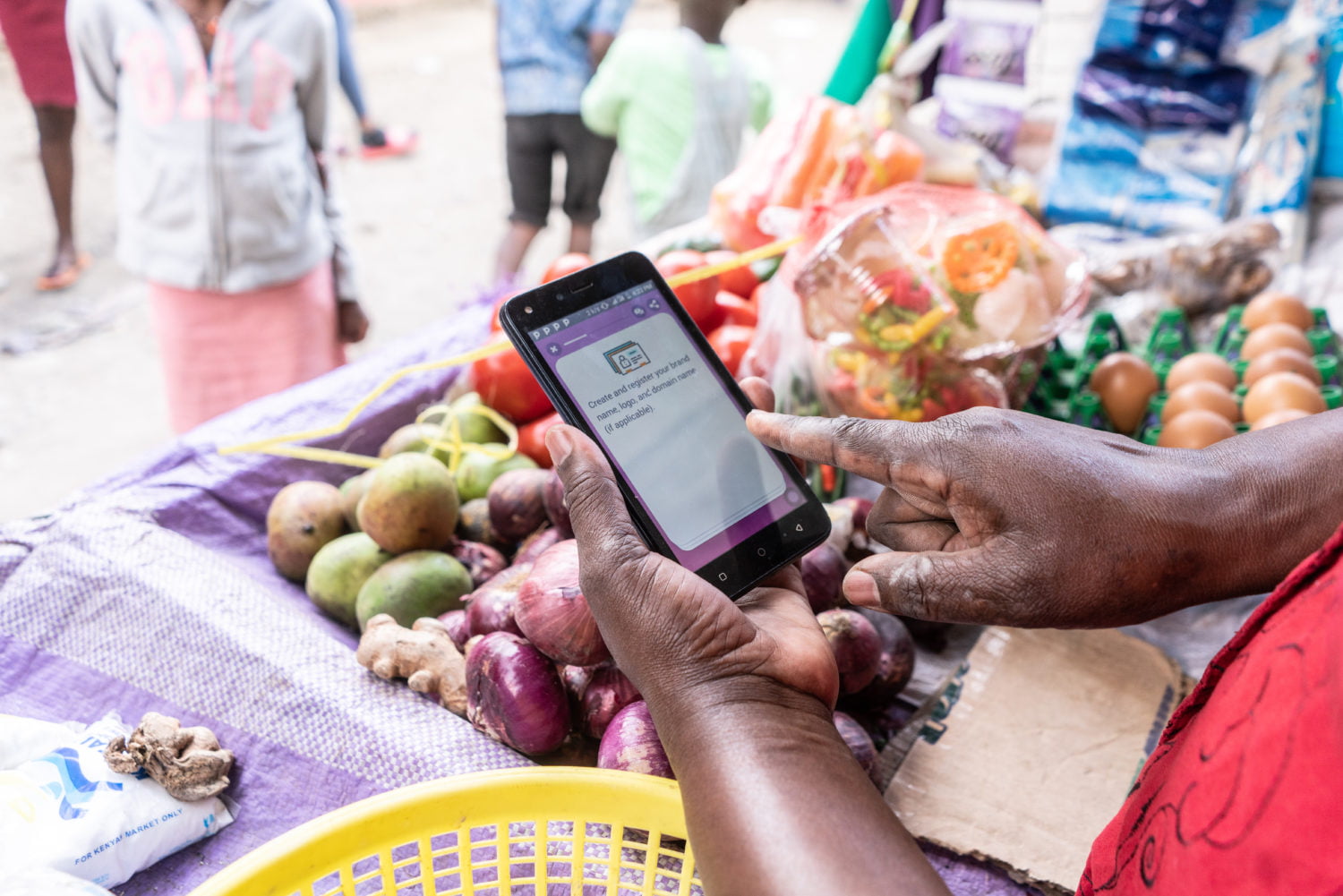
Catherine: This partnership has come at the right time and it’s definitely improving our offer to women entrepreneurs. The HerVenture app is of course 100% digital learning – for young women especially – which is perfect for us because we have a database of young women who are trading or starting businesses. What it comes down to, speaking from my own experience starting a business in my 20s, is record keeping, which the app teaches. It doesn’t sound like a big thing when you’re just starting out, but it ends up being the biggest thing when you need to access finance. Then larger finance comes down to the investment readiness process: how to pitch to an investor, what kind of information you need…
With financial institutions, we’ve seen that out of every 10 applications for debt, seven are dropped. Now, that may be for genuine reasons, such as that the business doesn’t qualify, but often it is because of the way the business was presented to the financier. That’s why I believe your Road to Finance programme – although we’re not running it – is valuable. It contextualises pitching to investors in a very similar way to our SME Investor Readiness programme.
Tackling gender stereotypes and unconscious bias
Helen: Hopefully we can run that programme together next time too. At the Foundation, we approach women’s economic equality and justice as a fundamental human right. We look at women’s individual business challenges – like accessing finance – but also the wider, systemic gendered barriers that hold women back, which are often underpinned by gender stereotypes, and which we find are often at play when it comes to decision-making by investors.
Catherine: Unconscious bias is a real challenge. It is absolutely there when accessing finance, for example: a woman may be offered less finance compared to a male counterpart with the same qualifications of running an enterprise. A lot of advocacy needs to be done to overcome this, particularly with the finance and agriculture industries. We have to recognise women as human beings with fundamental human rights and not merely as a quota to fill.
I believe mentorship programmes like the Foundation’s are critical because mentorship pushes a woman up in the face of such challenges, enabling her to access information in areas she might not have even known about. Sometimes you just need to learn from another fellow person who’s done it before rather than learning through a classroom. What’s your experience been?
We have to recognise women as human beings with fundamental human rights and not merely as a quota to fill.
Uplifting women through mentoring and leadership
Helen: Having met many women who have been mentored through our Mentoring Women in Business programme, it really is transformative! Because it’s focused on where the woman wants her business to go, what skills are needed from the mentor to support the woman, and that they work together on a plan to achieve the woman’s business goals, that partnership is so powerful. As the programme is online and cross-border, it provides a safe space for the woman where some of these issues around social norms aren’t there as much – her mentor isn’t somebody who her family knows or who’s in their community or who’s in the sector. We know from speaking to women entrepreneurs that a lot of the time they are held back because of others around them telling them “you can’t run a business” or “no one’s going to give you finance”. Then they have a mentor who is there both practically to support them, but also to be their cheerleader, and we see time and time again how incredibly powerful that is. Plus you’re working together on your own business in real-time so it’s incredibly personalised in a way that you wouldn’t get with a class.
In terms of unconscious bias, it’s absolutely a fact that discrimination exists. You see it in all the statistics about who gets access to what finance and it doesn’t make sense. Because of unconscious bias, if you are not putting women first and consciously discriminating in favour of women, you will be discriminating against them. If banks don’t start designing financial products for women and don’t look at the requirements in terms of collateral and consider that a woman isn’t going to be able to meet them, they need to do something about it. They need to either change the product so that women can access it or support women to have what is needed to use it.
Catherine: It also speaks to the importance of having women leaders in policy making who can push certain agendas and for policy to support women-owned enterprises. There are institutions that just won’t operate a certain way unless policy insists that they do. As an example in Kenya, we require that 30% of public procurement goes to women, youth and disabled people. That had to be put in policy for it to be operationalised and institutions are now audited on this.
Similarly, when we have women leaders in entrepreneurship then they have the ability to pay it forward by pulling up other women, and then these women pull up others. We learn from other successful women leaders and that impacts our families and communities. My daughter will see me running an enterprise as I did with my mother and be inspired. Neighbour will see neighbour. Overall you are able to empower women and girls to get into business.
Meet some of the women we've worked with
Since 2020 we've supported nearly 12,000 women in Kenya to start, sustain and grow their businesses
-
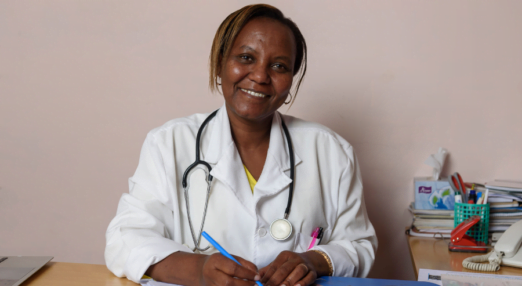
Dr. Catherine’s story: creating healthier communities
Dr. Catherine Amulundu's mental health & addiction treatment centre is providing necessary healthcare in Kenya and beyond.
Read more
-
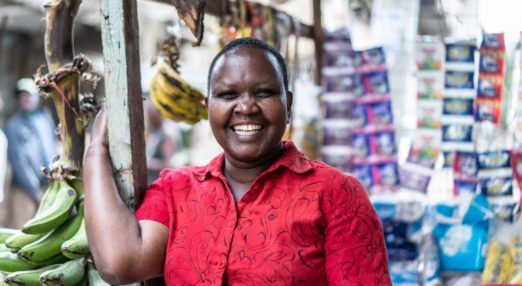
Juliet’s story
Juliet runs a vegetable stall in Nairobi. Our HerVenture mobile learning app supported her to develop her business skills, overcome the pandemic's challenges and start on the pathway to growth!
Read more
-
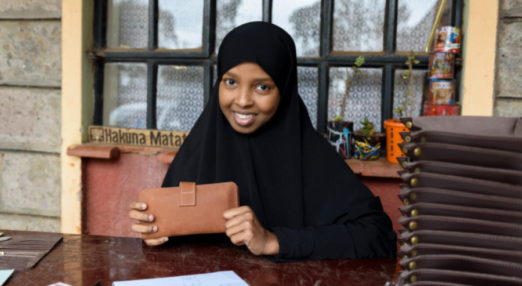
Muna’s story: paving the way for women in a male-dominated field
Muna's company is creating opportunities for women in Kenya's leather industry.
Read more